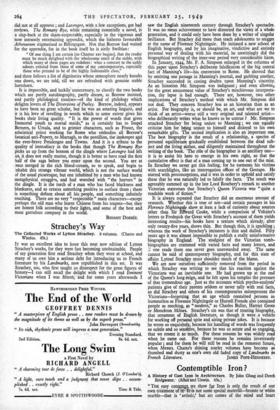Strachey's Way
IT was an excellent idea to issue this neat new edition of Lytton Strachey's works, for they were fast becoming unobtainable. People of my generation first read Strachey when they were at school, and many of us owe him a serious debt for introducing us to French literature by his Landmarks, now republished in this set. It was Strachey, too, who first taught us disrespect for the great figures of history—I can still recall the delight with which I read Eminent Victorians when I was fifteen, and for some years afterwards I
saw the English nineteenth century through Strachey's spectacles. It was no mean achievement to have distorted the views of a wholc generation, and it could only have been done by a writer of singular brilliance. But Strachey did More than teach adolescents to snigger at the name of Florence Nightingale. He initiated a new school of English biography, and by his imaginative, vindictive and entirely personal way of dealing with his material, he unwittingly did the biographical writing of the inter-war period very considerable harm.
In January, 1944, Mr. F. A. Simpson enlarged in the columns of this paper upon Strachey's deliberate falsification of the big central fact of Manning's life—his conversion to Rome. He showed that by omitting one passage in Manning's journal, and garbling another, Strachey succeeded in casting doubts upon Manning's sincerity. As an historian Mr. Simpson was indignant ; and even allowing for the great amusement value of Strachey's mischievous interpreta- tion, the lapse is bad enough. There are, however, two other implications of Strachey's method with which Mr. Simpson did not deal. They concern Strachey less as an historian than as an artist. For biography is, or should be, an art, and what are we to think of an artist—worse still a very original and talented artist— who deliberately writes what he knows to be untrue ? Mr. Simpson attacked Strachey for being unjust to Manning ; we can equally criticise him for being unjust to himself and disloyal to his own remarkable gifts. The second implication is also an important one. The best biography is the result of a relationship, a species of personal equilibrium gradually established between the dead sub- ject and the living author, and diligently maintained throughout the writing of the book. The role of the biographer is an ancillary one— it is to assist his hero to emerge in his own right, so that the cumulative effect is that of a man coming up to one out of the mist. In Strachey we never get this feeling, for he torments his victims with searchlights, like an interrogation officer of the Gestapo. He started with preconceptions, and it was in order to uphold and satisfy these that he was naturally led to falsify the facts. The result was agreeably summed up in the late Lord Rosebery's remark to another Victorian statesman that Strachey's Queen Victoria was " quite a readable work of fiction."
It is always repeated that Strachey did an enormous amount of research. Whether this is true of not—and certain passages in his Florence Nightingale show at least a lack of curiosity about sources other than Sir Eiikvard Cooke, while a comparison of Voltaire's letters to Frederick the Great with Strachey's account of them yields interesting results—his books have a texture which already, after only twenty-five years, shows thin. But though thin, it is sparkling ; whereas the work of Strachey's imitators is thin and dulled. Fifty years ago it was almost impossible to publish a really uninformative biography in England. The stodgiest of the Victorian tomb- biographies are crammed with varied facts and many letters, and is one reads them one never goes unrewarded away. The same cannot be said of contemporary biography, and for this state of affairs Lytton' Strachey must shoulder much of the blame.
We are now ourselves sufficiently removed from the period in which Strachey was writing to see that his reaction against the Victorians was an inevitable one. He had grown up at the end of the Queen's long ,reign, and he felt upon his temples the pressure of that tremendous age. Just as the accounts which psycho-analysts' patients give of their parents seldom or never tally with real facts, so did Strachcy and others of his contemporaries misrepresent the Victorians—forgetting that an age which contained persons as humourless as Florence Nightingale or Hurrell Froude also contained people as mocking, as " modern," as Charles Buller, Harriet Grote or Monckton Milnes. Strachey's sin was that of treating biography, that ornament of English literature, as though it were a vehicle for working off personal spite and airing private jokes. It is because he wrote so exquisitely, because his handling of words was frequently so subtle and so sensitive, because he was so astute and so engaging, that we resent it so much. For these reasons he was widely read when he came out. For these reasons he remains inveterately popular • and for them he will still be read in the remotest future, when Messrs. Chatto's shining scarlet volumes have become as thumbed and dusty as one's own old faded copy of Landmarks in


































 Previous page
Previous page